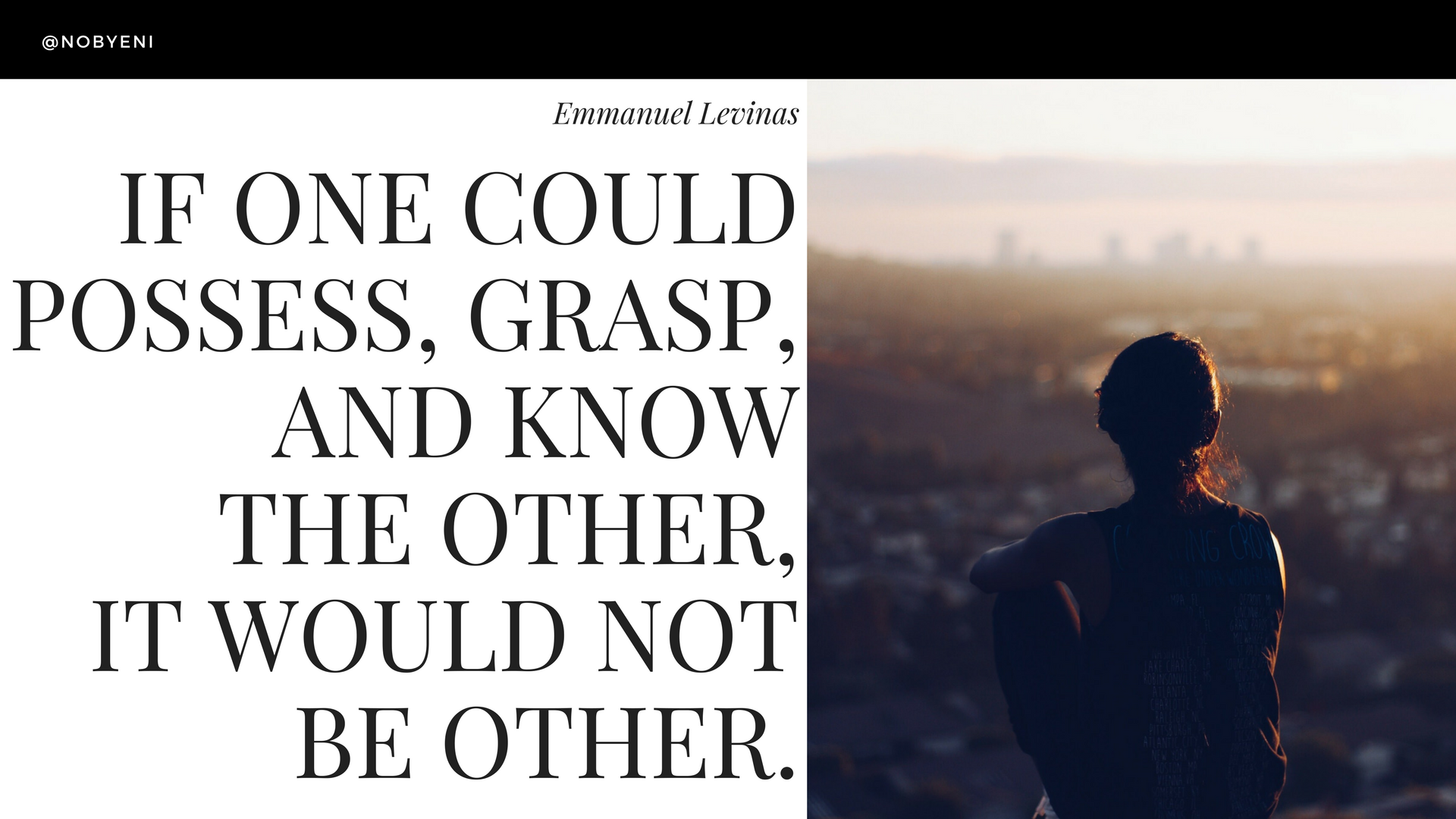The problem of 'We' - a reflection on the philosophy of Emmanuel Levinas
philosophy·@nobyeni·
0.000 HBDThe problem of 'We' - a reflection on the philosophy of Emmanuel Levinas
Why do we say 'we'? Is that an honest attempt at inclusion, at sympathy? But does it work? Or does it do more harm than provide support to the other I want to reach out to, by saying we instead of I? ### Encounters Sometimes you meet someone who writes and thinks about stuff that connects to your own life and thinking. For me, that someone is @erh.germany, whom I met only a couple of days ago, and we've not yet disagreed about anything, but we do have a lot to say about the same or similar things. (See for instance [her reply about the concept of 'rejection' as the best personal training ever](https://steemit.com/life/@erh.germany/rejections-best-personal-training-ever) she wrote after reading my [post about rejection being a crucial part of a writers' life](https://steemit.com/writing/@nobyeni/handling-rejection-a-crucial-aspect-of-a-writers-life).) In [her latest post](https://steemit.com/blogging/@erh.germany/do-you-have-authority-do-you-want-more-quality), @erh.germany raises the question **why people talk in the 'we'-format, instead of saying 'I'**. She explains how this makes her feel uncomfortable. She posits that saying 'I' instead of 'we' creates more value and quality. And she explores why the over-using of 'we' makes her feel like something is wrong, and she invites others to respond to this. So here is my response. ### From Agency to Authority. A problem when saying 'we' and not saying 'I' has to do, as @ehr.germany rightly remarks, with the concept of the self and how it behaves toward other people. To think about this, let's start out to think about the concept of agency, instead of authority. Writing things from a personal perspective, saying that 'I' think this or that, can feel authoritative, but is actually a more honest way to take responsibility for one's own views. (Which is not to say those views are unique... uniqueness is overvalued, but that is another problem [I wrote about two days ago](https://steemit.com/value/@nobyeni/forget-being-unique-and-please-keep-those-inspirational-quotes-to-yourself).) This doesn't have much to do with authority, but is related to agency. The power to be oneself, to act for oneself, is generally considered 'agency', not authority. Except of course when you want to claim something *for* someone else, then agency is transformed into authority. A type of authority that Germans (but also many other people around the world) understandably have a problem with. Because the road from authority to dictatorship is short. A slippery slope, I'd say. ### Emmanuel Levinas and his idea of the 'Other' So here enters the necessity of philosophy, as philosophers have thought about this as well, and can perhaps help us out. Have you ever heard of Emmanuel Levinas (1906-1995)? He somehow tackles a problem that I think @ehr.germany is touching upon, when she talks about the problem of saying 'we' instead of daring to say 'I'. I agree with her analysis, that we have an authority problem, and that talking about 'we' makes things look profound, but actually degrades the quality of a reflection. But even though I agree with her analysis to some level, I don't think that is precisely the fundamental problem to this phenomenon. I'd like to evoke Levinas's ideas to explain what I'm thinking about. Levinas developed his thought not in the least as a response to the horrors of WWII, of what pure authority can do to a person. His basic question boils down to the following: how can we make sure that we can never have that situation again, the situation of denying existence of another human being. He noticed that many problems arise from the fact that there is a gap between myself and any other person. We can never truly take the point of view of the other person. You could take this in a nihilistic way: as it also means that we can never truly understand someone else, so why would we care, let's just put our own view first. But Levinas saw that this is not the way forward, so he went back to the Scriptures he had studied when growing up as a Jewish boy. And he noticed that it is possible that something happens between two people, between myself and the other person, if only allow it. There can be a moment in which what is truly me, is called on precisely because the Other looks at me. He relates this to the story in the Bible that we know as the parable of the Good Samaritan. Levinas explains that parable as follows. Whereas normally people will not look at someone who is dirty and injured, lying at the side of the road, it is the Samaritan who cannot *not* look. By looking at the injured person, he is *called* to be human. The ethical responsibility, Levinas even says, is first with the Other, and then with my self. > “I am responsible for the Other, without waiting for reciprocity, were I to die for it” ~ Emmanuel Levinas ### A capitalized Other Yes, the 'other' in this case is capitalised, because for Levinas the Other is no longer simply someone else, but it is an Other that remains completely different, completely other. The alterity of the Other is acknowledged, the other-ness of the Other is a primary notion. It is from that position of otherness, that ethics starts. That we can start thinking about what is right, for me. About what is the good life, for me. Without this complete Other, someone I don't reduce to something or someone I know and understand, I wouldn't be able to become human myself. > “To approach the Other in conversation is to welcome his expression, in which at each instant he overflows the idea a thought would carry away from it. It is therefore to receive from the Other beyond the capacity of the I, which means exactly: to have the idea of infinity. But this also means: to be taught.” ~ Emmanuel Levinas ### Levinas and the problem of 'we' So how does this all relate to the question we started with? By talking about a 'we', you impose a specific idea of the 'other' on to someone else. The relationship of you with the other is dominated by you, by your own views. This is maybe normal, as you can only look at things the way you do. But this is also a problem, because it assumes there is a common ground, something you see in the other that you recognise in yourself. And you are not simply offering this commonality to the other, you force it on him. Precisely by saying 'we'. A good example of this is given in the book 'On Hospitality' by Jacques Derrida and Anne Dufourmantelle. Derrida talks about how when we meet a complete stranger, the first thing we ask is his or her name. We think this is a type of respect - because then we can name the other person according to his or her own name. It is a form of acknowledging the other, right? But what we forget, Derrida says, is that in asking somebody for his name, we already force a lot of things on this person. Derrida says that the real stranger, the refugee, is the perfect moment to evaluate how hospitable we are, how accepting of the Otherness of the Other we are. Do we ask his or her nationality, his or her name? What if he or she doesn't have a name, no paperwork, do we still accept him or her as a guest? Do we impose our language, do we only accept the person's name when we understand the language in which the response is offered? So, in short. By using 'we', you impose something of yourself. This is a violence against the Other-as-Other. Levinas asks us to turn this around, to allow for the other to call forth something in yourself. So, to start with the 'you' in total openness, not having any expectations beforehand. And through the Face of the Other, learn something about yourself. This is what a true conversation looks like (notice the word 'convert' and 'conversation' are very close?).  Ok, so far this short reflection on Levinas. I do think this opens up a new perspective on things, at least it did for me. ### Friendship with the Other Last but not least, I'd like to mention that this experience has made me reconsider my definition of friendship. Friendship from now on, is when one person can allow the other the be themselves, more themselves. A friend calls on the other to let their singularity come to the front. A friend is the person who respects the otherness of the other to such a degree, that they will not allow for anything less. *ps.* I did think about whether I use 'I' or 'we', as requested per @erh.germany's post, and mostly I use the 'I' format - in one case I started typing 'we', to make a point of including everyone, but actually it was a fallacy, so I took it out. But as @modnar pointed out in the comments, I did use way more 'we' than I thought! So will have to give this some more thought in my next posts... Thank you for including that exercise, very helpful! <center><a href="https://steemit.com/@nobyeni"></a></center>